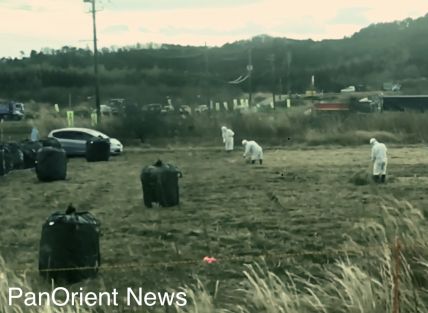|
|
Environment
Greenpeace Accuses Japan of Misleading UN on Radiation Danger
Sunday, March 10, 2019
 Soil cleanup in Fukushima
Soil cleanup in Fukushima
Tokyo- (PanOrient News)
A report and survey released this month by Greenpeace blames the Japanese government for purposely misleading the U.N. and experts about the danger presented by radiation levels in parts of Fukushima, where cleanup is ongoing after a 2011 nuclear disaster. The report draws special attention to the possible dangers faced by decontamination workers and children.
“In its reporting to the United Nations, the Japanese government deliberately misrepresents the scale, complexity, and radiation risks in areas of Fukushima, the working practice and conditions for workers, and its disregard for children’s health and wellbeing,” said Kazue Suzuki, the energy campaigner of Greenpeace Japan. “This reality should shame the government to radically change its failing policies.”
Within the last year, UN rapporteurs have brought up concerns to the Japanese government about the exploitation of decontamination workers and the government’s lack of sufficient concern for child safety in contaminated areas. Greenpeace’s report fully backs these concerns.
The report, based on surveys taken in October 2018, concludes that radiation levels will remain higher than international recommendations and the Japanese government’s own target levels for decades to come, including in places where evacuation bans have been lifted or are likely to be lifted in the next few years. Measurements were taken in the towns of Namie and Iitate, where evacuation orders are being eased little by little.
The report also claims that decontamination workers are being exploited by not being adequately informed about their own safety risks and how to protect themselves. It cites the recruitment of economically desperate workers, abuse by subcontractors and the falsification of workers’ documents as more evidence of mistreatment.
“In areas where some of these decontamination workers are operating, the radiation levels would be considered an emergency if they were inside a nuclear facility,” said Shaun Burnie, the senior nuclear specialist of Greenpeace Germany. “These workers have received almost no training in radiation protection, are poorly paid, exposed to high radiation, and risk losing their jobs if they speak out.”
Minoru Ikeda, a former decontamination worker featured in the report, said that as someone who had been at the scene, he wanted to tell the world what is happening.
“I want to call on the Japanese government to respect the health of works and stop sending people to do these dangerous jobs, and also to provide proper support for the workers,” said Ikeda.
Greenpeace additionally says that the Japanese government began a process last year to edit its long-term decontamination target, accusing it of simply shifting the goal posts in order to paint a rosier picture than reality.
“This is a politically motivated process with the aim of allowing the government to claim success in its decontamination program, which in reality has failed,” claims the report. “This is a cynical disregard for public health protection and the human rights of Japanese citizens.”
© PanOrient News All Rights Reserved.
|
|